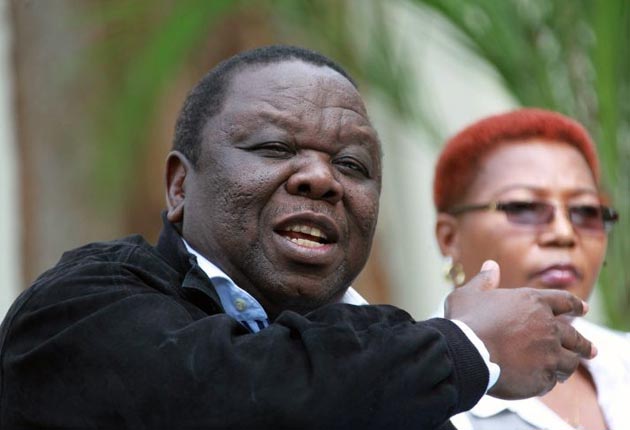Tsvangirai eyes 'divorce' from Mugabe as coalition totters

Your support helps us to tell the story
From reproductive rights to climate change to Big Tech, The Independent is on the ground when the story is developing. Whether it's investigating the financials of Elon Musk's pro-Trump PAC or producing our latest documentary, 'The A Word', which shines a light on the American women fighting for reproductive rights, we know how important it is to parse out the facts from the messaging.
At such a critical moment in US history, we need reporters on the ground. Your donation allows us to keep sending journalists to speak to both sides of the story.
The Independent is trusted by Americans across the entire political spectrum. And unlike many other quality news outlets, we choose not to lock Americans out of our reporting and analysis with paywalls. We believe quality journalism should be available to everyone, paid for by those who can afford it.
Your support makes all the difference.Zimbabwe's fragile power-sharing government was on the brink of collapse yesterday with both sides claiming irreconcilable differences and foreign diplomats warning of a spike in political violence.
Prime Minister Morgan Tsvangirai has said the government is "dysfunctional" and called this week for a "divorce" from President Robert Mugabe and his Zanu-PF party.
Although Mr Tsvangirai stressed yesterday that he had not yet quit the government, the outburst from the leader of the former opposition Movement for Democratic Change (MDC) came at the end of a week in which the party lost control of parliament and a cabinet minister and close ally of Mr Tsvangirai was arrested without explanation. The fresh crisis was accompanied by a statement of concern from Western diplomats at what they called the "increasing evidence in recent weeks of what appears to be politically motivated intimidation and violence".
The upsurge in violence and the use of the police and courts to harass political opponents has led analysts to question whether Mr Mugabe is preparing to call a snap election in the troubled southern African nation. After two years of supposed power-sharing, there is widespread frustration in Zimbabwe at the ageing President's continued control over all meaningful levers of power in the country. The US recently renewed targeted sanctions against some 100 individuals who make up the 87-year-old's inner circle and still have authority over the security services, the judiciary and much of the economy.
This week, Mr Mugabe's party succeeded in using the Supreme Court to remove MDC rival Lovemore Moyo as Speaker of Parliament. Allies of the Energy Minister Elton Mangoma, another MDC MP who was arrested on unspecified charges, said the police action was a reprisal by Mugabe allies angry at losing kickbacks from state-sponsored fuel purchases.
Education Minister David Coltart, formerly one of Mr Tsvangirai's defence lawyers during his marathon treason trials, said he was "outraged" by the arrest of his colleague and blamed it on Mugabe hardliners determined to wreck the unity government.
Mr Tsvangirai, who has been criticised for agreeing to share power despite years of state-sponsored arrests, beatings and murders that he and his supporters endured, called on regional governments to agree a "clear road map" to a new election in Zimbabwe.
Under the power-sharing deal negotiated by neighbour South Africa, Zimbabwe was meant to have agreed a new constitution and enacted a raft of reforms to guarantee free and fair elections. But civil society groups say the consultation process for the constitution has been wrecked by violent intimidation by the same gangs of thugs that Mr Mugabe unleashed in the build-up to the last election in 2008.
After 31 years in power, the former schoolteacher has responded to the popular uprisings which toppled fellow despots in North Africa by clamping down harder on signs of dissent. Students were arrested in the capital Harare last month for gathering to watch events in Egypt on a television set. Rallies with gangs of state-sponsored Zanu-PF youth have been hastily organised and peaceful demonstrations intended to mark International Women's Day were violently broken up. Previously protests by trade unionists were stopped by police despite having the required permits.
The coalition partners have also clashed over controversial plans to nationalise mines and acquire a majority stake in foreign companies with the MDC warning this would stop outside investment and derail economic recovery.
Join our commenting forum
Join thought-provoking conversations, follow other Independent readers and see their replies
Comments